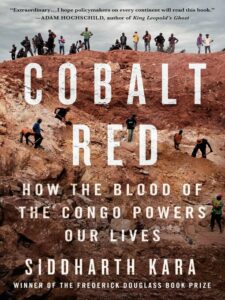
“Please tell the people of your country, a child in the Congo dies every day so that they can plug in their phones.”
Have you ever wondered how rechargeable batteries work? If you haven’t, you’re not alone. Rechargeable battery-powered devices have become ubiquitous in our daily lives. Indeed, we only really think about them once they can’t hold a charge anymore, which often prompts us to get a new device. Few of us know how these batteries are made, or what material is required to make them. So how do they work?
To condense a lot of complicated chemistry, rechargeable batteries use several precious minerals which allow them to take in and keep an electrical charge. And of these minerals, cobalt is the most essential. Cobalt is the mineral which enables batteries to keep and hold an electrical charge. But there’s a problem. Cobalt is only naturally available in certain parts of the world. So, how does a rare mineral like cobalt get from the earth to the batteries of our phones, tablets, and electric vehicles? I recently listened to an audiobook called Cobalt Red: How the Blood of the Congo Powers our Lives by Siddharth Kara, a book about cobalt mining in the Democratic Republic of the Congo (DRC). And some of the answers to that question are quite shocking.
Seventy percent of the world’s cobalt supply comes from the DRC. Big tech companies and, increasingly, sovereign governments from around the world are trying to meet the demands for the latest electronic products. Entities like these have a vested interest in making sure that cobalt mining in the Congo continues. And as Kara makes clear in Cobalt Red, those interests have caused disastrous consequences for both the environment and the people of the Congo.
Kara is a researcher who has made his career investigating human trafficking and other forms of modern slavery. For Cobalt Red, Kara went to the Congo to learn about the cobalt mining process and speak to the people, including children, who mine the metal in appalling conditions. Throughout the book he also speaks with officials of the Congolese government, Chinese mining company employees who transport the cobalt from the mines to the global supply chain, and other less savory people who profit off cobalt mining. The level of detail Kara is able to share with the readers is astonishing, and the performance of Peter Ganim, the narrator of the audiobook, really helps convey the depths of the catastrophe happening in the Congo. It is a rough read at times.
Still, I recommend that you read this book. Books like Cobalt Red are important because they give a platform for people on the margins to share their stories, providing further context to complex issues. The quote I used to start this post is one of many quotes that have stuck with me since I read this book. Their testimonies are important and need to be heard. If you have the time, please consider listening to them.
You can place a copy of Cobalt Red on hold at Heights Libraries, or get the ebook or audiobook on Overdrive/Libby.
